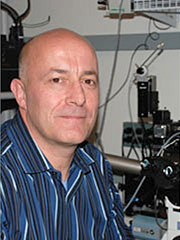
The microenvironment that supports a cancerous tumor also starves the immune cells that the body sends in to destroy the cancer, University of Pittsburgh Cancer Institute (UPCI) scientists revealed in a discovery that holds the potential to significantly boost the performance of breakthrough immunotherapy drugs.
The UPCI team—including McGowan Institute for Regenerative Medicine affiliated faculty member Simon Watkins, PhD, Founder and Director of the Center for Biologic Imaging at the University of Pittsburgh, a member of the UPCI, and also a Professor (with tenure) and Vice Chairman within the Department of Cell Biology—showed that when immune T cells enter the tumor microenvironment, their mitochondria—which act as mini-factories inside cells, making energy and crucial reagents a cell needs to survive—begin to shrink and disappear, indicating that the T cell is out of fuel and can’t do its tumor-destroying job. The finding opens the door to several potential clinical approaches that could help keep T cells functioning and boost the body’s ability to fight cancer.
“Immunotherapy to stimulate the body’s immune system has increasingly become the way we treat people with aggressive cancers. It’s effective for a subset of patients, but the truth is that only about 20 to 40 percent of patients will respond to the treatment, and it is still unclear why,” said senior author Greg M. Delgoffe, PhD, assistant professor of immunology and member of the Tumor Microenvironment Center at UPCI, partner with UPMC CancerCenter. “It’s a huge question in the cancer immunotherapy field, and we think we’ve found a big part of the answer.”
As tumors grow, they build a microenvironment, which develops its own blood supply and keeps the tumor thriving, protected, and voraciously consuming all available nutrients.
When T cells enter the microenvironment, it’s as if they’re “automobiles that suddenly had the emergency brake applied; they can’t keep driving,” explained Dr. Delgoffe. Immunotherapies, like those that target negative regulators on the T cell surface, take these brakes off. “However, what we’re discovering in many cases is that even though the brakes have been taken off, there isn’t any fuel in the tank,” Dr. Delgoffe said. Or—in scientific terms—the lack of mitochondria in the tumor-infiltrating T cells keeps them from functioning.
“This is an exciting discovery because we already have various strategies to ‘fill the fuel tank’ and support T cell function in the tumor microenvironment,” said Dr. Delgoffe.
In laboratory experiments and tests with mice, Dr. Delgoffe and his team found that when they boosted the mitochondria in the T cells, they were better able to clear the tumor.
Dr. Delgoffe is partnering with other scientists to test various mitochondria-boosting strategies, including using drugs that already have proven safe in humans, such as those for type 2 diabetes, to stimulate T cell metabolism. He’s also working with existing immunotherapy studies to further modify the T cells so that their metabolism functions better in the tumor microenvironment.
Read more…
UPMC/University of Pittsburgh Schools of the Health Sciences Media Relations News Release
Abstract (The tumor microenvironment represses T cell mitochondrial biogenesis to drive intratumoral T cell metabolic insufficiency and dysfunction. Nicole E. Scharping, Ashley V. Menk, Rebecca S. Moreci, Ryan D. Whetstone, Rebekah E. Dadey, Simon C. Watkins, Robert L. Ferris, Greg M. Delgoffe. Immunity; 08/02/16.)
